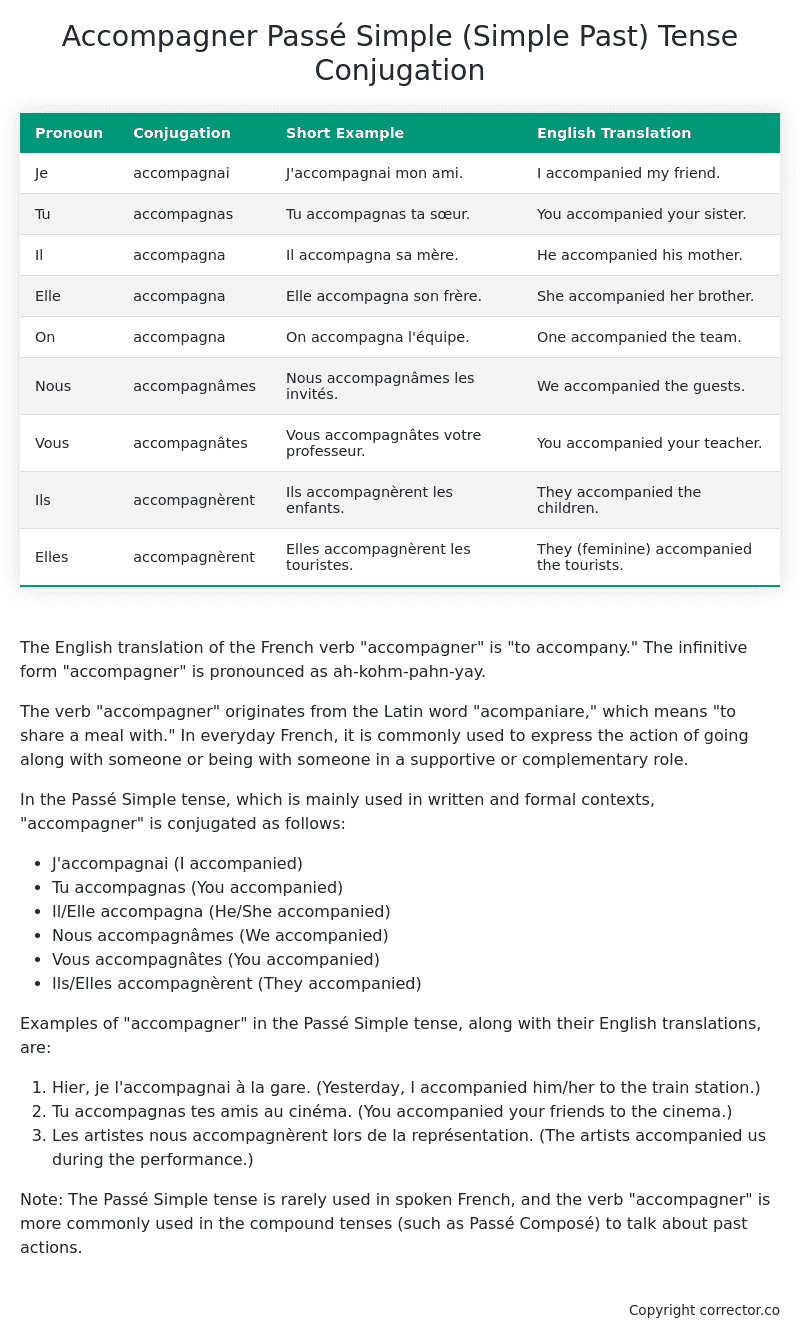Passé Simple (Simple Past) Tense Conjugation of the French Verb accompagner
Introduction to the verb accompagner
The English translation of the French verb “accompagner” is “to accompany.” The infinitive form “accompagner” is pronounced as ah-kohm-pahn-yay.
The verb “accompagner” originates from the Latin word “acompaniare,” which means “to share a meal with.” In everyday French, it is commonly used to express the action of going along with someone or being with someone in a supportive or complementary role.
In the Passé Simple tense, which is mainly used in written and formal contexts, “accompagner” is conjugated as follows:
- J’accompagnai (I accompanied)
- Tu accompagnas (You accompanied)
- Il/Elle accompagna (He/She accompanied)
- Nous accompagnâmes (We accompanied)
- Vous accompagnâtes (You accompanied)
- Ils/Elles accompagnèrent (They accompanied)
Examples of “accompagner” in the Passé Simple tense, along with their English translations, are:
- Hier, je l’accompagnai à la gare. (Yesterday, I accompanied him/her to the train station.)
- Tu accompagnas tes amis au cinéma. (You accompanied your friends to the cinema.)
- Les artistes nous accompagnèrent lors de la représentation. (The artists accompanied us during the performance.)
Note: The Passé Simple tense is rarely used in spoken French, and the verb “accompagner” is more commonly used in the compound tenses (such as Passé Composé) to talk about past actions.
Table of the Passé Simple (Simple Past) Tense Conjugation of accompagner
| Pronoun | Conjugation | Short Example | English Translation |
|---|---|---|---|
| Je | accompagnai | J’accompagnai mon ami. | I accompanied my friend. |
| Tu | accompagnas | Tu accompagnas ta sœur. | You accompanied your sister. |
| Il | accompagna | Il accompagna sa mère. | He accompanied his mother. |
| Elle | accompagna | Elle accompagna son frère. | She accompanied her brother. |
| On | accompagna | On accompagna l’équipe. | One accompanied the team. |
| Nous | accompagnâmes | Nous accompagnâmes les invités. | We accompanied the guests. |
| Vous | accompagnâtes | Vous accompagnâtes votre professeur. | You accompanied your teacher. |
| Ils | accompagnèrent | Ils accompagnèrent les enfants. | They accompanied the children. |
| Elles | accompagnèrent | Elles accompagnèrent les touristes. | They (feminine) accompanied the tourists. |
Other Conjugations for Accompagner.
Le Present (Present Tense) Conjugation of the French Verb accompagner
Imparfait (Imperfect) Tense Conjugation of the French Verb accompagner
Passé Simple (Simple Past) Tense Conjugation of the French Verb accompagner (You’re reading it right now!)
Passé Composé (Present Perfect) Tense Conjugation of the French Verb accompagner
Futur Simple (Simple Future) Tense Conjugation of the French Verb accompagner
Futur Proche (Near Future) Tense Conjugation of the French Verb accompagner
Plus-que-parfait (Pluperfect) Tense Conjugation of the French Verb accompagner
Passé Antérieur (Past Anterior) Tense Conjugation of the French Verb accompagner
Futur Antérieur (Future Anterior) Tense Conjugation of the French Verb accompagner
Subjonctif Présent (Subjunctive Present) Tense Conjugation of the French Verb accompagner
Subjonctif Passé (Subjunctive Past) Tense Conjugation of the French Verb accompagner
Subjonctif Imparfait (Subjunctive Imperfect) Tense Conjugation of the French Verb accompagner
Conditionnel Présent (Conditional Present) Tense Conjugation of the French Verb accompagner
Conditionnel Passé (Conditional Past) Tense Conjugation of the French Verb accompagner
Conditionnel Passé II (Conditional Past II) Tense Conjugation of the French Verb accompagner
L’impératif Présent (Imperative Present) Tense Conjugation of the French Verb accompagner
L’impératif Passé (Imperative Past) Tense Conjugation of the French Verb accompagner
L’infinitif Présent (Infinitive Present) Tense Conjugation of the French Verb accompagner
L’infinitif Passé (Infinitive Past) Tense Conjugation of the French Verb accompagner
Le Participe Présent (Present Participle) Tense Conjugation of the French Verb accompagner
Le Participe Passé (Past Participle) Tense Conjugation of the French Verb accompagner
Struggling with French verbs or the language in general? Why not use our free French Grammar Checker – no registration required!
Get a FREE Download Study Sheet of this Conjugation 🔥
Simply right click the image below, click “save image” and get your free reference for the accompagner Passé Simple tense conjugation!

Accompagner – About the French Passé Simple (Simple Past) Tense
Formation
Usage
Narration
Historical Context
Interactions with other tenses
Passé Composé
Imparfait
Conditional and Subjunctive
Summary
I hope you enjoyed this article on the verb accompagner. Still in a learning mood? Check out another TOTALLY random French verb conjugation!


